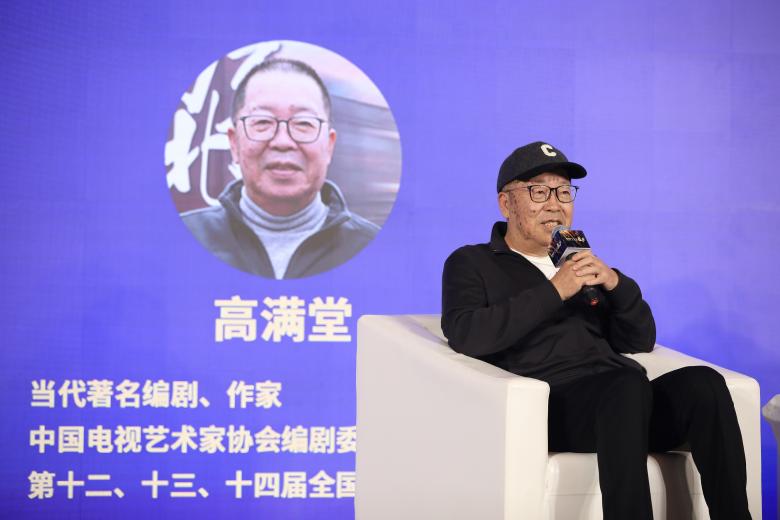
Recently, at the "Master Class" of the 2023 China·Beijing TV Drama Festival, the famous novelist and playwright Chen Yan, and the famous screenwriter and writer Gao Mantang gave a wonderful speech on the theme of "Where do wonderful scripts come from" experience sharing.

A group photo of the "Master Class" guests at the 2023 China Beijing TV Drama Festival
Write the story that the creator wants to write from the heart
After Chen Yan's novel "Zhuangtai" was adapted into a TV series of the same name, it gained both ratings and reputation, and his other novel, "The Protagonist", the winner of the 10th "Mao Dun Literary Award", is also being produced by the creator of "Zhuangtai" The original cast has been adapted into a TV series and will be available to the audience in the near future.
Chen Yan's creative path began when he participated in the county's essay competition when he was 18 years old. The award-winning work gave Chen Yan a huge incentive. At the age of 22, Chen Yan had completed 6 scripts. Recalling his experience in the industry, Chen Yan said frankly: "In the 1980s, I was also a literary young man and wrote many novels and essays. At that time, it was mainly to satisfy my desire for publication. Later, when I was 25, I was transferred to the Shaanxi Opera Academy , and then became a professional screenwriter.”

Chen Yan
In more than 20 years of working with opera, Chen Yan felt the most authentic texture of history from a collection of 4,000 classical opera scripts. He said, "Opera has one characteristic. Whether it is comedy, tragedy, elegance or vulgarity, it should be a synthesis. You can see it as history swinging in front of you, rather than draining life and Dry history.”
Chen Yan has been studying Chinese opera at the Shaanxi Opera Research Institute for 25 years. "It was very helpful to my later creations, including my opera creation, drama creation, TV drama creation, including novel creation." Therefore, Chen Yan is very important to me. Today's young TV drama screenwriters have put forward a suggestion: exposure to more stage plays and Chinese classical operas can arouse thinking about modernity. "No matter what kind of creation you are engaged in, you can form a mutually nourishing and growing relationship with other creative forms."
Combining his own creative experience, Chen Yan gave a second piece of advice: open your own creative path. "Every creator should open an interface into life. For example, what I found is the way of Chinese classical opera. I enter through this interface, understand real life through historical life, and thus open a creative path. I think this Things have the greatest effect on me.”
In addition, he emphasized that creation must obey one's own heart, "Many of our current anxieties are caused by our requirements for typed creation. When doing typed creation, you will have a lot of anxiety, such as always questioning: I am this thing Can it be classified into this category?" But in his view, what is more important than typed creation is to create characters and write the stories that the creator wants to write from the heart.
When talking about "Installation", Chen Yan proposed that "the most important thing in creation is to write about familiar life." When he was the dean of the Academy of Traditional Chinese Opera, Chen Yan often observed the work of the background stage workers through the window. In particular, he was deeply impressed by the sleeping position of an installer who bent his body into an arch shape and hugged the heating pipe while sleeping. "Writing "The Stage" has a huge relationship with this period of life. These three works ("The Stage", "Protagonist" and "Comedy") are a tribute to my 25-year career as a screenwriter in the theater."
When the screenwriter is writing the script, he must have a camera on his head
Gao Mantang, who has been engaged in the film and television industry for 40 years, has witnessed the development of Chinese TV dramas from youth to maturity. His masterpieces are familiar to generations of Chinese audiences: "Nine Phoenixes in the Family", "Crossing the Guandong", "The North Wind Blows" and "Wenzhou Family" ”, “Old Farmer”, “Old Tavern”, etc., are all classics among domestic original TV series. His practice of realist creative methods has yielded fruitful results.
As an excellent and senior screenwriter, Gao Mantang does not shy away from the failures he has experienced in his career in public: In 1981, after watching his first TV series, he decided to become a screenwriter. He was criticized for being different; after joining Dalian TV Station in 1983, his first screenwriting work "The Sound of Music on a Deserted Island" was poorly received when it was broadcast, and he was scolded so much that he couldn't hold his head up; in 1987, he was criticized for not being able to hold his head up when he was writing "No. 15 Bamboo Forest Street" With the addition of extramarital affairs, he was named and criticized by the media. In 2004, "The Wrong Love" was created in response to the marketization trend of TV dramas, making him a representative of domestic "bloody dramas".
In his view, these experiences are detours he has taken, and reflection on these detours and re-examination of himself have led him to the right path - insisting on putting life first and taking the path of realistic creation. "It is better to think of one detail than to think of a hundred plots. A hundred plots can be made up, but you cannot make up one detail, a real and life detail."
"Anyone who is interested in working in film and television. You must first be connected with life, keep blending with each other, and keep being infected by it." Gao Mantang mentioned that a screenwriter sits at home all day long and relies on information, the Internet, and the Internet. Information fills life and inspires inspiration. "Be sure to be vigilant at this time. Maybe you can indeed inspire creative inspiration, but maybe 10,000 similar inspirations have already been born, and you are only the 10,001th person." Works based on information on the Internet can easily become monotonous and lack individuality. "The story has no personality, the characters have no personality, the plot has no personality, let alone the screenwriter's own style?"
He sincerely gave advice to young people, "So children who have the conditions should go out more while they are young and get to know more people who move you, are strange and unforgettable." Make biographies of all kinds of people you come into contact with. He revealed at the scene that there are more than 1,000 biographies on his computer. To give an example, Gao Mantang shared in detail the story of how he became friends with a small fishmonger in the morning market. This story fully explains how he observes, perceives, captures materials and refines characters in life.

Gao Mantang
Gao Mantang then shared the impressions left on him by several co-directors: Director Chen Guoxing likes to play it out by himself when discussing the script, and he does not hesitate to roll on the floor; Director Kong Sheng listened to the screenwriter's explanation of the play, with his eyes half open and half closed, and finally spoke The moment hits the mark; Director Mao Weining has lots of body language and speaks passionately; Director Liu Jiang thinks very quickly and often destroys the screenwriter's foundation; Director Zhang Xinjian's workbook is filled with all kinds of notes, word count It’s almost like a literature book…
Through these sharings, Gao Mantang wants young screenwriters to know that directors are also of all kinds and different, and advises them to make more director friends and have director awareness. "When we screenwriters are writing scripts, we must have a camera on our head."
He also used whether there is "subconscious" in creation to distinguish professional screenwriters from "fanciers": "'Subconscious' is the simplest sentence: Don't go with it, go in the opposite direction. 'Follow it' is for the general audience. From the perspective of one, two, three to more than fifty scenes, the plots are all predictable by the audience. You, the creator, just don’t have a subconscious mind. What is a subconscious mind? It’s ‘reverse’. If you have this awareness, you are Scriptwriter."
Gao Mantang also shared his experience as a screenwriter from the TV drama era working with today's online video platforms. He admitted that at first, he felt uncomfortable with the creative workflow style of the online platform. Later, after collaborating on multiple projects, he found that there was no problem of who conquered whom. "As long as we return to professional standards, communication is possible. In the end, there is the famous saying: 'There is no right or wrong in art, only high or low.'"
Two senior creators in the fields of novel creation and original screenwriting have joined hands to bring this master class, which has become a highlight of this Beijing TV Drama Festival. The two's experience sharing, case analysis, and on-site Q&A provided young practitioners with fresh first-hand creative experience and provided valuable reference for young creators.
